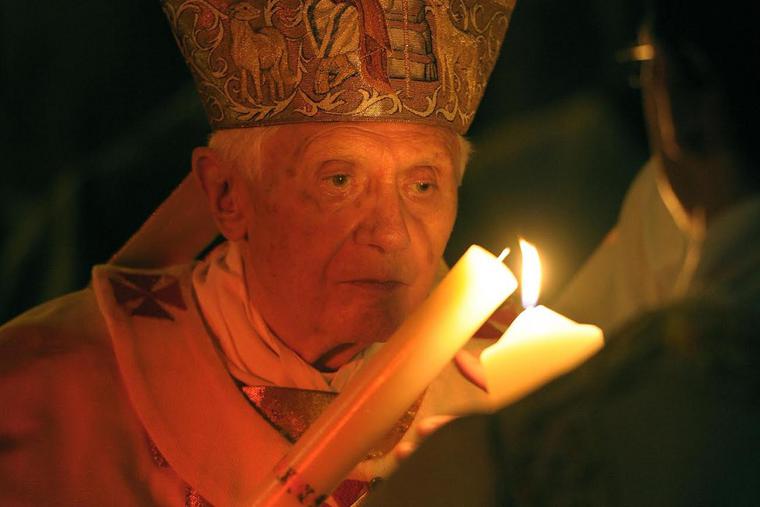Pope Benedict XVI’s Clear Answer to the Eternal Plagues of Avarice and Luxury
COMMENTARY: Caritas in Veritate is both timely and deeply meaningful. Truth is what gives value and meaning to charity.

“The state is suffering from two opposite vices, avarice and luxury; two plagues which, in the past, have been the ruin of every great empire.”
This quotation has a timeless ring to it. Its author could very well have been Arnold Toynbee, Christopher Dawson, Thomas Sowell, Romano Guardini or any number of social observers who have witnessed these plagues that are currently ravaging America. The quotations, however, belongs to Titus Livius (Anglicized as “Livy”), the Roman historian who wrote these words more than 2,000 years ago.
Luxury and avarice (also known as greed) are riveted to the human condition. The gap between the “haves” who need to protect their wealth, and the “have-nots” who envy the “haves,” has been a perennial problem throughout the world. This problem may be more acute than it has ever been, especially in the United States. Do we admire or do we envy the ultra-rich? A brief survey of celebrity homes raises the question, “How much luxury does a person need? Just to name three notable examples:
— Film director George Lucas lives in a home valued at an estimated $100 million. It features a 300-seat theater, an underground parking lot for 200, and a two-story library.
— Oprah Winfrey’s domicile, in comparison, is a mere $88 million. It has 14 bathrooms and a man-made stocked lake for fishing.
— Computer guru Bill Gates lives in a $125 million mansion that stretches over 66,000 square feet and has 24 bathrooms plus an indoor/outdoor pool with an underwater music system.
The luxury of the wealthy inevitably fosters greed. Michael Douglas, in the role of Gordon Gecko, the ultimate Wall Street bandit — in the 1987 Oliver Stone film Wall Street — represents everyone who hungers after luxury in his theatrical address to a paper company’s stockholders: “Greed is right. Greed works. Greed clarifies, cuts through and captures the essence of the evolutionary spirit. Greed in all its forms — has marked the upward surge of mankind, and greed, you mark my word, will not only save Teldar Paper, but that other malfunctioning corporation called the USA.”
We witness this same out-of-control desire for meaningless acquisitions in the highly acclaimed 1941 Orson Welles motion picture, Citizen Kane.
In Leo Tolstoy’s short-story, “How Much Earth a Man Needs,” a Russian, who is already rich, wants to increase his wealth. He is told by the elders of a tribe in the east that he can claim for himself all the land he can traverse on foot in one day. Greed impels him to stake much more land than he can possibly acquire in this manner. When he races back to the starting point, he falls dead of exhaustion. The elders laugh as they dig his grave saying: “This is how much earth man needs”.
In his 2009 encyclical, Caritas in Veritate, Pope Benedict XVI addresses the growing problem of the disparity between the rich and the needy. In italics, to emphasize the point, he states, “The world's wealth is growing in absolute terms, but inequalities are on the increase” (22).
The encyclical’s title — “Love in Truth” — is both timely and deeply meaningful. Truth is what gives value and meaning to charity. “Without truth,” Pope Benedict writes, “charity degenerates into sentimentality. ... It falls prey to contingent subjective emotions and opinions, the word ‘love’ is abused and distorted, to the point where it comes to mean the opposite.”
We know only too well how easily “love,” uprooted from truth, is misdirected and, as a consequence, benefits no one. A culture that rejects truth also, at the same time, rejects love in its authentic form.
Luxury itself may not be a sin, but to pile up frivolous luxuries may be a sin against justice. David Cloutier’s book, The Vice of Luxury: Economic Excess in a Consumer Age, calls into question the pattern of excessive and needless possessions while ignoring those who need the necessities of life. His chapter on “Luxury and Necessity. What is Enough?” provides interesting insights on a most important subject.
Pope Benedict argues that one of the roots to the failure to share wealth with others is a certain disregard for human life in all its forms, including the lives of the unborn:
“Openness to life is at the center of true development. When a society moves towards the denial or suppression of life, it ends up no longer finding the necessary motivation and energy to strive for man's true good. If personal and social sensitivity towards the acceptance of a new life is lost, then other forms of acceptance that are valuable for society also wither away. The acceptance of life strengthens moral fiber and makes people capable of mutual help. By cultivating openness to life, wealthy peoples can better understand the needs of poor ones, they can avoid employing huge economic and intellectual resources to satisfy the selfish desires of their own citizens, and instead, they can promote virtuous action within the perspective of production that is morally sound and marked by solidarity, respecting the fundamental right to life of every people and every individual” (28).
He urges people to look at things with “new eyes and a new heart, capable of rising above a materialistic vision of human events” (77). Our charity must be anchored in truth, a truth that will recognize, in justice, the needs of all and the futility of possessing luxuries far beyond what is reasonably needed.
















